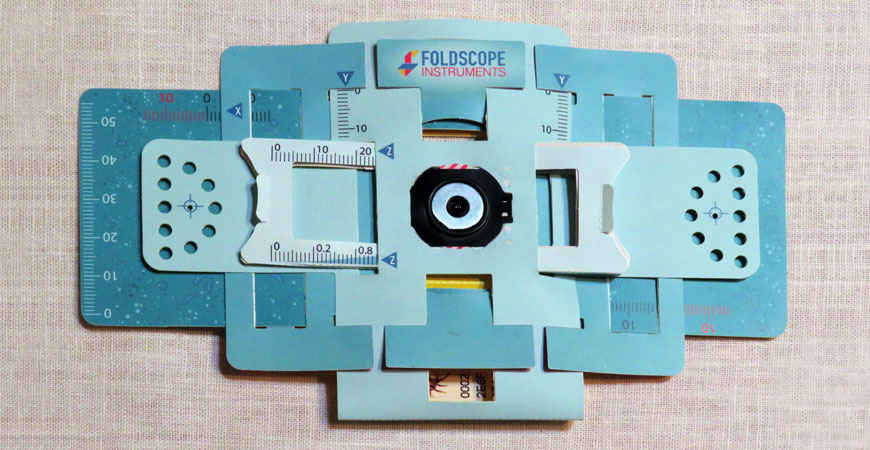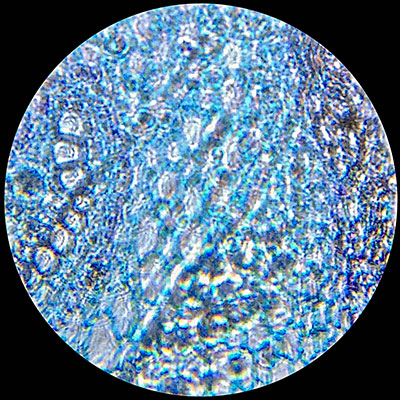
The coronavirus pandemic has upended everything, including UC Merced’s classes and research. But materials science and engineering Professor Christopher Viney and recent graduate and independent study student Jasmine Nava are working on a microscopy project, even without access to their usual lab.
They are characterizing the starches in banana peels to find out what makes them so slippery. Nava is at home in Santa Ana and Viney is in Atwater. Neither has an advanced microscope at home, but their research continues with the help of an invention from Stanford University — the Foldscope.
The flat paper microscopes, about the size of an standard envelope, are inexpensive, portable, easy to assemble, and have a magnification of 140X and a 2-micron resolution, meaning users can see things as small as bacteria, blood cells and single-celled organisms. They can also connect the scopes to cell phones or tablets to take pictures of what they see.
The deluxe Foldscope kits are $29.99 each, and come with small flashlights, sample-collection bags and tubes, tweezers, pipettes, slides, ultra-clear tape for making quick slides or coverslips and other equipment, all in a tin container that looks like a student’s pencil box.
“Working with a paper microscope is not like working with a $50,000 microscope, but if we were trying to do this in the lab on campus right now, there would have to be a protocol for heightened cleaning between users, and some of those chemicals are not good for the microscopes,” Viney explained. “Plus, you’d have the problem of social distancing.”
When the state’s stay-at-home orders were issued, Viney explored this option.
“These are innovative, very cheap — they cost less than a dollar each to produce — and have been deployed around the world for education and public health applications, especially in developing countries,” Viney said.

Not only have he and Nava been using the scopes, they’ve been evaluating them, too, for potential use in San Joaquin Valley schools that could be guided remotely by a teacher.
“I couldn’t get mine together in two weeks, but my younger siblings had it together in less than an hour,” Nava said with a laugh. “Now they are looking at starches with me, as well as things they find in the yard.”
The scopes are designed for younger users, and Nava said the scopes are fun to put together and simple to use once assembled.
“I am soundly impressed with how Jasmine has applied herself to this project,” Viney said. “She has been obtaining consistently better results with her Foldscope than I have with mine.”
In previous years, Viney has worked with Engineering Service Learning teams that have aimed to enhance science, technology, engineering and math curricula in area schools, and as the Foldscope makers offer package deals for classrooms, the Foldscopes would be a great option for schools that are holding remote classes this fall.
Nava’s independent study course is finished and, by fall, her work with Viney will be completed, too. She’s leaving for an internship in Arizona, but for now, she’s still part of the project, even without pay or class credit, just because she’s enjoying it and Viney is willing to keep meeting with her each week, remotely. Nava said she’s always been interested in medicine, but after taking a materials science class with Viney and learning about the many ways the two fields overlap, she chose materials science as a major.
Viney, chair of the Department of Materials Science and Engineering , said he has been impressed by Nava’s work ethic and her willingness to try the new microscopes to help him evaluate them. He said it has been a valuable learning experience, not just about materials, but about science, too.
“This is research,” he said. It’s not just gathering data, you have to design the experiments, too.”



